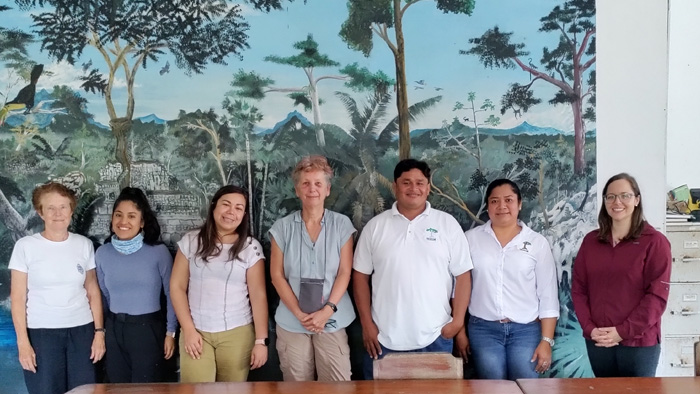Project team and collaborators
The project is led by Professor Sarah Metcalfe at the University of Nottingham, in collaboration with colleagues within Nottingham, the University of Liverpool and the University of Stirling.
It is a collaborative effort with the project partners and advisory panel (the Ya’axche Conservation Trust (Figure 2), the Caribbean Community Climate Change Centre, the Ministry of Agriculture, Food Security and Enterprise in Belize, ECOSUR in Mexico, Baylor University in USA and Northumbria University in the UK).
El proyecto está dirigido por la Prof. Sarah Metcalfe de la Universidad de Nottingham, en colaboración con otros colegas de Nottingham, de la Universidad de Liverpool y de la Universidad de Stirling.
Se trata de un esfuerzo de colaboración con los miembros del proyecto y el panel de asesores (Ya'axche Conservation Trust (Figura 2), Centro de Cambio Climático de la Comunidad del Caribe, Ministerio de Agricultura, Seguridad Alimentaria y Empresa en Belice, ECOSUR en México, la Universidad de Baylor en EE.UU. y la Universidad de Northumbria en el Reino Unido).
Project team members (Miembros del equipo del proyecto)
Co-Investigators (Co-investigadores)
Postdoctoral researchers (Investigadores postdoctorales)
Steering Committee/Advisors (Panel de asesores)
- Dr Donneil Cain - Caribbean Community Climate Change Centre, Belize (Centro de Cambio Climático de la Comunidad del Caribe, Belice)
- Christina Garcia - Ya'axche Conservation Trust, Belize
- Dr Julie Hoggarth - Baylor University, USA (Universidad de Baylor, EE.UU.)
- Ina Iris Sanchez - Ministry of Agriculture, Food Security and Enterprise, Belize now University of Belize (Ministerio de Agricultura, Seguridad Alimentaria y Empresa, Belice, ahora Universidad de Belice)
- Dr Birgit Schmook (ECOSUR, Mexico)
- Professor Bronwen Whitney - Northumbria University, UK (Universidad de Northumbria, Reino Unido)

Figure 2. Meeting with Ya'axche Conservation Trust, during the first fieldwork (January 2023).
Figura 2. Reunión con Ya'axche Conservation Trust durante el primer trabajo de campo (enero 2023).
Affiliations (Afiliaciones)